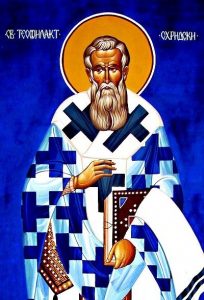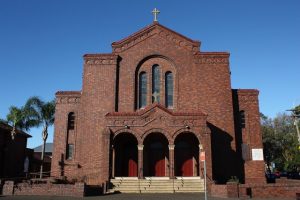Homily For Mass For 20th Sunday Ordinary Time B

HOMILY FOR MASS FOR 20TH SUNDAY ORDINARY TIME B + INSTALLATION FR VALENTIN MENDOZA-MORALES CS
St. Thérèse Church, Mascot

Cynthia Voigt is a prolific author of novels for young adults. Homecoming, the first of seven books in her Tillerman series, was nominated for several international prizes and adapted for film. It tells the story of four children, aged 6 to 13, whose mother, after struggling to raise them as a single mother without welfare support, suffered a mental breakdown and abandoned them in a carpark. Rather than risking the children being taken into care and then split up into different foster homes, the eldest child, Dicey, leads them, mostly on foot, for a 100km to an aunt in Bridgeport, Connecticut. Finding no satisfactory solution there, they set out again, this time in search of their grandmother, a further 500km south in Crisfield, Maryland.
I won’t spoil the story for you, but I can’t help revealing that there’s a happy ending. Along the way, however, the children face the grief and anger that attends abandonment; they also experience hunger and exhaustion, prejudice and danger. So their journey is not just physical but emotional. What keeps them going is the determination to find some caring relative and a place to call home; nothing will distract them from the goal of homecoming. They emerge from their journey changed but still themselves and still together, having endured many hardships in a world less than ideal.
In our epistle this morning (Eph 5:15-20), St. Paul judges his own age less than ideal also: evil he calls it, for foolishness is commonplace, God’s will ignored, drunkenness and debauchery the usual escape. We might be filled with the Holy Spirit but those around us drink very different spirits. His pun is humorous, but Paul is deadly serious: only by our lives can this a wicked age be redeemed.
Paul’s word for ‘age’ here – καιρός – is an unusual one, rare in secular Greek, but used by Jesus in the Gospels.[1] It doesn’t simply mean calendar ‘time’ or geological ‘age’, but connotes a critical time, a time of danger requiring urgent action, the appointed time.[2] Throughout history people have often thought themselves or their times uniquely cursed. How often do we, too, think our world is on the verge of ‘going down the gurgler’ in some spectacular and perhaps definitive way? Yet Paul’s thought is that it is precisely in at such tipping points that Christians are so opportune: it is to hazardous times like these that we are sent and, challenging as that might be, they are times when we can make a difference.
So word καιρός indicates a moment of danger that can also be a moment of opportunity. This is why it is frequently used in the New Testament to describe the time of redemption, liberation, glory. Christ’s birth, His appearing on the scene as an adult, and His return to the Father are all described as a καιρός. If by our lives we are to redeem our age, it is only because we have been redeemed by Christ; if we are to contribute to our age, help the orphans (like the Tillerman children), the stranger, the homeless or the destitute, if we are to speak the truth wisely, courageously and lovingly, if we are to lead and serve, we must have one eye in the problems of this world and one on our ‘homecoming’ in the age to come. We care for the children of this world like Dicey and her siblings, all the while knowing that their final rest and ours will only be with our true family – the Blessed Trinity and the Communion of Angels and Saints.

The journey to that place can be long and arduous. Like the Tillerman kids, we may experience loss, hunger, exhaustion or danger, especially of an emotional or spiritual kind. To ask us to redeem our age may altogether too big a challenge. And so Jesus in our Gospel (Jn 6:51-58) offers us food to satisfy our hunger, drink not to daze but to quench us, hope in our fear, substance in our emptiness. Eat my Bread and drink my Wine – my Body and Blood – He says, do so frequently and reverently so as to live forever. But in the meantime “He who eats my flesh and drinks my blood lives in me and I live in him,” says the Lord. This is the homecoming we all most deeply desire: finding our home in Christ and Christ making His home in us. As 11th century Bulgarian Archbishop and Saint, Theophylact of Ohrid (to whom Fr Valentin no doubt has a particular devotion) pointed out, God has made human flesh one with Himself, so our flesh might have His ‘life-giving power’. Put an iron rod in the fire and it remains iron, but it assumes the energy of fire. Unite the Lord’s flesh with yours in Holy Communion and we remain human beings, but we also enjoy divine life or grace.[3] We arrive home but changed, purified, energised, better.
Fr Valentin inherits a parish of such divine energy in its ministries: Catholic primary school, state-school catechists, adult bible sharing, rosary group, Schoenstatt apostolate, Legion of Mary, St. Vincent De Paul, youth ministry and more: there’s a lot happening here! You are also blessed to have the Scalabrini Fathers, long contributing their charism to our migrant city and beyond, but especially through their community to Mascot parish. There are many causes for celebration – but not for complacency. If 1 in 5 Catholics in the area attends Mass on Sunday that’s great and we thank God for that. But we ache for the other 4 out of 5 who are not with us, and the others again who have no spiritual home even to be neglecting. We must ask ourselves, again and again, how we can best reach out to the unconverted and the diverted, so they will come home to the Father here.
Fr Valentin will now be responsible on my behalf for the worship, evangelisation and service in this parish. In his priestly service, he must sanctify you by prayer and sacrament. In his prophetic ministry, he must proclaim the Gospel and Church teaching in season and out. In his shepherding, he must lead and serve as Christ did. But he cannot do this all by himself. Together, priests and people achieve far more than any one of us could do alone. To strengthen Fr Valentin for his new task, we now have the formal Rites of Installation of a Parish Priest. They are a useful reminder to us all, not just of his mission but of yours as brothers and sisters in the Lord. I ask you, of your mercy, to keep supporting Fr Valentin, as he prays for and serves you.
INTRODUCTION TO MASS FOR 20TH SUNDAY ORDINARY TIME B +
INSTALLATION FR VALENTIN MENDOZA-MORALES CS
St. Thérèse Church, Mascot

Welcome to this morning’s Mass, when I will formally install Fr Valentin Mendoza-Morales CS as Parish Priest of the parish of St. Thérèse, Mascot. I acknowledge Very Rev. Fabio Baggio, Undersecretary for Refugee and Migrant issues of the [Vatican] Dicastery for Promoting Human Development, concelebrating with me today, along with Fr Maurizio Pettenà CS, Director of the Australian Catholic Migrant and Refugee Office, Fr Emmanuel Chuntic CS, and, of course, our new parish priest, Fr Valentin Mendoza-Morales CS.
From the civic community I acknowledge: Hon. Matt Thistlethwaite MP, Federal Member for Kingsford Smith; Hon. Ron Hoening MP, State Member for Heffron; Councillor Bill Saravinovski, Mayor of Bayside, with fellow Councillors Scott Morrisey, Dorothy Rapisardi and Paul Sedrak.
From the local school, I welcome Vice Principal Helena Mullen and Religious Education Coordinator Michelle Homsy.
Finally, a very warm welcome to the parishioners of St. Therese! In witnessing the Rites of Installation of a Parish Priest we all have a chance to reflect on the stages of our faith journey. So as we begin this Mass, giving thanks for our Catholic faith and Church, let us repent of our sins…
[1] Mt 21:34; 8:29; 26:18; 10:15; 11:22, 24; 12:36; Mk 1:15; Lk 12:42; 19:44; 12:54-6; 21:8; 17:22,26; Jn 7:6; also found in Rom, 1 Tim, 2 Thess, 1 Thess, 1 Cor, 2 Cor, 2 Pet, Phil and Jude. In fact the term is used 86 times in the New Testament.
[2] Cf. James Barr, Biblical Words for Time (2009); Erik Eynikel and Katrin Hauspie, “The use of καιρός and Χρονός in the Septuagint,” Ephemerides Theologicae Lovanienses 73 (1997), pp. 369-385
[3] St. Theophylact of Ohrid, Commentary on John, ch. 6.

